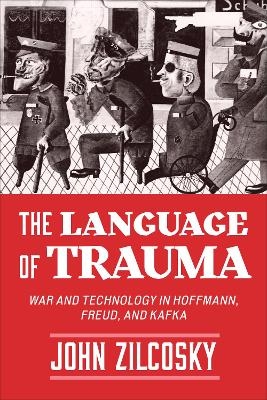
The Language of Trauma
War and Technology in Hoffmann, Freud, and Kafka
Seiten
2021
University of Toronto Press (Verlag)
978-1-4875-0942-2 (ISBN)
University of Toronto Press (Verlag)
978-1-4875-0942-2 (ISBN)
Richly nuanced and firmly grounded in literature, biography, and history, The Language of Trauma analyses three major central European writers, revealing how they incorporated and responded to psychological and historical trauma.
From the Napoleonic Wars to the invention of the railway to the shell shock of World War I, writers tried to give voice to the suffering that war and industrial technology had wrought all around them. Yet they, like the doctors who treated these victims, repeatedly ran up against the incapacity of language to describe such anguish; those who suffered trauma, those who tried to heal it, and those who represented it were all unable to find the appropriate words. In The Language of Trauma, John Zilcosky uncovers the reactions of three major central European writers – E.T.A. Hoffmann, Sigmund Freud, and Franz Kafka – to the birth of modern trauma in the nineteenth and early twentieth centuries.
Zilcosky makes the case that Hoffmann, Freud, and Kafka managed to find the language of trauma precisely by not attempting to name the trauma conclusively and instead allowing their writing to mimic the experience itself. Just as the victims’ symptoms seemed not to correspond to a physical cause, the writers’ words did not connect directly to the objects of the world. While doctors attempted to overcome this indeterminacy, these writers embraced and investigated it; they sought a language that described language’s tragic limits and that, in so doing, exemplified the wider literary and philosophical crisis of their time. Zilcosky boldly argues that this linguistic scepticism emerged together with the medical inability to name the experience of trauma. He thereby places trauma where it belongs: at the heart of both medicine’s diagnostic predicament and modern literature’s most daring experiments.
From the Napoleonic Wars to the invention of the railway to the shell shock of World War I, writers tried to give voice to the suffering that war and industrial technology had wrought all around them. Yet they, like the doctors who treated these victims, repeatedly ran up against the incapacity of language to describe such anguish; those who suffered trauma, those who tried to heal it, and those who represented it were all unable to find the appropriate words. In The Language of Trauma, John Zilcosky uncovers the reactions of three major central European writers – E.T.A. Hoffmann, Sigmund Freud, and Franz Kafka – to the birth of modern trauma in the nineteenth and early twentieth centuries.
Zilcosky makes the case that Hoffmann, Freud, and Kafka managed to find the language of trauma precisely by not attempting to name the trauma conclusively and instead allowing their writing to mimic the experience itself. Just as the victims’ symptoms seemed not to correspond to a physical cause, the writers’ words did not connect directly to the objects of the world. While doctors attempted to overcome this indeterminacy, these writers embraced and investigated it; they sought a language that described language’s tragic limits and that, in so doing, exemplified the wider literary and philosophical crisis of their time. Zilcosky boldly argues that this linguistic scepticism emerged together with the medical inability to name the experience of trauma. He thereby places trauma where it belongs: at the heart of both medicine’s diagnostic predicament and modern literature’s most daring experiments.
John Zilcosky is a professor of German and Comparative Literature at the University of Toronto.
Acknowledgments
List of Illustrations
Introduction: Literature, Trauma, and the Sign of Illness
1. Hoffmann at the Battle of Dresden: “The Sandman” and the Napoleonic Wars
2. Freud and World War I: The Uncanny Trauma of Contagion
3. Inexplicable Tears: Trains, Wars, and Kafka’s Aesthetic of Indeterminacy
Conclusion: The Poetics of Trauma: Simulation, Causality, and the Crisis of Insurance
Notes
Index
| Erscheinungsdatum | 08.07.2021 |
|---|---|
| Zusatzinfo | 10 b&w illustrations |
| Verlagsort | Toronto |
| Sprache | englisch |
| Maße | 152 x 229 mm |
| Gewicht | 280 g |
| Themenwelt | Geisteswissenschaften ► Sprach- / Literaturwissenschaft ► Anglistik / Amerikanistik |
| Geisteswissenschaften ► Sprach- / Literaturwissenschaft ► Literaturwissenschaft | |
| Studium ► Querschnittsbereiche ► Geschichte / Ethik der Medizin | |
| ISBN-10 | 1-4875-0942-1 / 1487509421 |
| ISBN-13 | 978-1-4875-0942-2 / 9781487509422 |
| Zustand | Neuware |
| Informationen gemäß Produktsicherheitsverordnung (GPSR) | |
| Haben Sie eine Frage zum Produkt? |
Mehr entdecken
aus dem Bereich
aus dem Bereich
Die Geschichte eines Weltzentrums der Medizin von 1710 bis zur …
Buch | Softcover (2021)
Lehmanns Media (Verlag)
CHF 27,90
von der Antike bis zur Gegenwart
Buch | Softcover (2024)
C.H.Beck (Verlag)
CHF 16,80
Krankheitslehren, Irrwege, Behandlungsformen
Buch | Softcover (2024)
C.H.Beck (Verlag)
CHF 55,90


